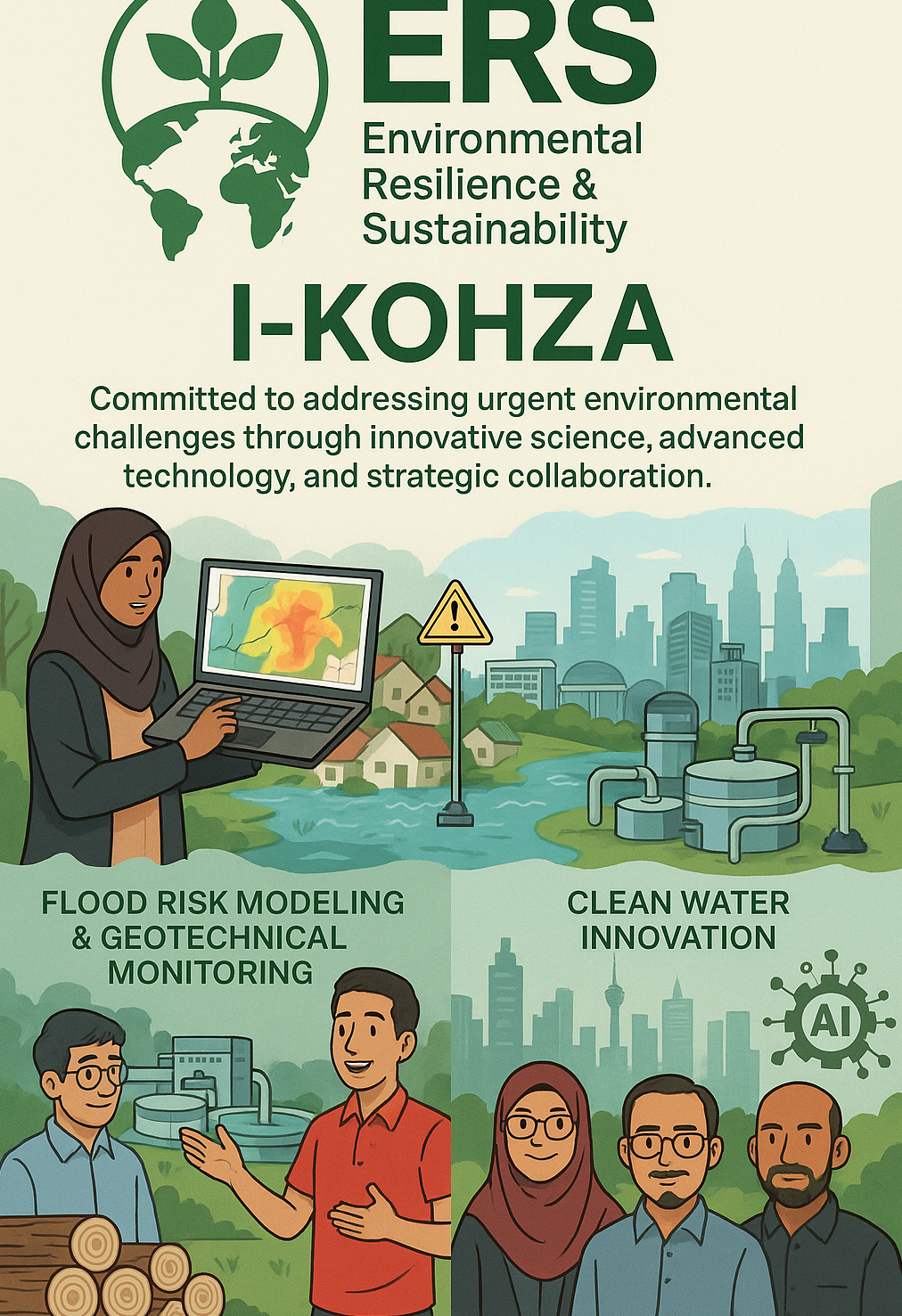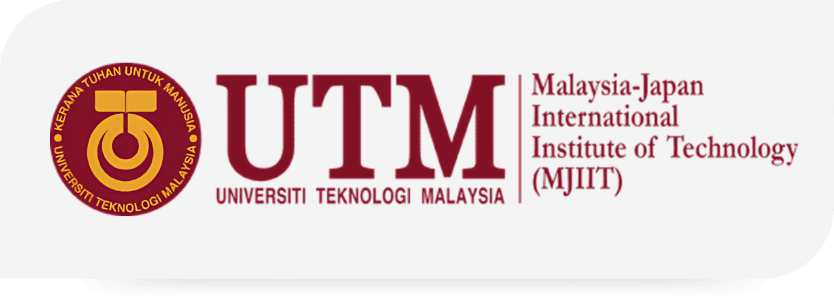Malaysia-Japan International Institute Technology (MJIIT)
Environmental Resilience & Sustainability (ERS)

The Environmental Resilience and Sustainability (ERS) iKohza at MJIIT is an interdisciplinary research group committed to addressing urgent environmental challenges through innovative science, advanced technology, and strategic collaboration. From flood risk modeling and geotechnical monitoring to clean water innovation and biomass management, our team applies the latest methods—including artificial intelligence (AI)—to solve complex problems and protect both people and the planet. With strong linkages to academia, industry, government, and regional partners, ERS iKohza strives to build a safer, smarter, and more sustainable future for Malaysia and beyond.
Basic Information
The ERS iKohza focuses on interdisciplinary research that addresses critical issues in environmental resilience and sustainability. Key areas include flood forecasting and risk analysis, dam safety and maintenance, and landslide monitoring using geotechnical and remote sensing technologies. The iKohza also explores integrated water resource management, clean water treatment, and energy conservation. Advanced methods such as artificial intelligence (AI) and IoT are applied to enhance predictive capabilities and decision-making. Through lab and field-based research, the iKohza aims to develop practical solutions that support disaster risk reduction and sustainable environmental management across Malaysia and the ASEAN region.
Research Focus Areas
Main Research Themes/Keywords (5–10 keywords):
- Environmental Sustainability
- Disaster Risk Reduction
- Flood Modeling
- Artificial Intelligence (AI)
- Geotechnical Monitoring
Description of Research Focus Areas (Max 200 words):
The ERS iKohza focuses on interdisciplinary research that addresses critical issues in environmental resilience and sustainability. Key areas include flood forecasting and risk analysis, dam safety and maintenance, and landslide monitoring using geotechnical and remote sensing technologies. The iKohza also explores integrated water resource management, clean water treatment, biomass and wastewater valorization, and energy conservation. Advanced methods such as artificial intelligence (AI) and IoT are applied to enhance predictive capabilities and decision-making. Through lab and field-based research, the iKohza aims to develop practical solutions that support disaster risk reduction and sustainable environmental management across Malaysia and the ASEAN region.
Facilities and Equipment
🔧 Key Equipment and Software Available in ERS iKohza:
1. Autodesk AutoCAD P&ID – for intelligent piping and instrumentation diagram design.
2. Microsoft Office Professional 2013 – for document processing and data analysis.
3. Visio Pro for Office 365 – for technical diagramming and flowchart creation.
4. VisSim – visual modeling software for dynamic systems and control simulations.
5. Proteus Design Suite Version 8 – for electronic design automation (EDA) and circuit simulation.
6. Ignition by Inductive Automation – web-based SCADA development platform for real-time monitoring and control.
7. MATLAB, Simulink, xPC Target, and Stateflow – for advanced numerical computing, simulation, and embedded systems prototyping.
8. Saline Mixing Plant – for experimental research and modeling of water quality and environmental processes.
Research Projects
List of Ongoing/Recent Projects or Grants:
🌊 Disaster Risk Reduction & Forecasting
Flood Disaster and Early Warning: Application of ANFIS for River Water Level Forecasting
Multi-Step Traffic Flow Forecasting: Comparing One-Step vs Horizon-Step Strategies Using PSO-Optimized SVR and LSTM Models
🧠 Health & AI in Environmental Systems
Performance Enhancement of Alzheimer's Disease Diagnosis Using Generative Adversarial Networks (GANs)
Exceptional Performance with Minimal Data: GAN-Based Alzheimer’s Disease Classification
🔋 Sustainable Energy & Smart Control
An Adaptive Frame and Intelligent Control Approach for an Autonomous Hybrid Renewable Energy System Integrating PV, Wind, and Fuel Cell Technologies
🌱 Process Optimization & Industrial Sustainability
Troubleshooting Degumming and Bleaching Processes in Palm Oil Refining Using a Fuzzy Expert System with Thematic Analysis
Research Outputs
Selected Publications (Last 3 Years):
Wijaya, A. A. J. I., Ramli, M. S., Abdullah, S. S., & Ariffin, M. K. A. M. (2024). Neuroadaptive natural logarithm sliding mode control for nonlinear active suspension systems. IEEE Transactions on Intelligent Vehicles. https://doi.org/10.1109/TIV.2024.3393840
Abdalla, S. A., & Abdullah, S. S. (2025). An adaptive frame and intelligent control approach for an autonomous hybrid renewable energy technology. Alexandria Engineering Journal. https://doi.org/10.1016/j.aej.2024.11.048
Omar, M., Abdullah, S. S., Mohd, M., Salleh, M. F., & Salih, S. Q. (2024). One-step vs horizon-step training strategies for multi-step traffic flow forecasting. Expert Systems with Applications, 224, 124154. https://doi.org/10.1016/j.eswa.2024.124154
Ching, W. P., Abdullah, S. S., Othman, N. A., & Rahim, S. F. A. (2024). Transfer learning for Alzheimer’s disease diagnosis using EfficientNet-B0 CNN. Journal of Advanced Research in Applied Sciences and Engineering Technology, 34(3), 181–191. https://doi.org/10.37934/araset.34.3.181191
Wijaya, A. A. J. I., Ariffin, M. K. A. M., Abdullah, S. S., & Ramli, M. S. (2024). Adaptive estimation and control of nonlinear suspension systems. IEEE Access. https://doi.org/10.1109/ACCESS.2024.3393970
Ching, W. P., Abdullah, S. S., Othman, N. A., & Rahim, S. F. A. (2023). Enhancing multi-stage classification of Alzheimer’s disease with attention mechanism. In Proceedings of the IEEE International Conference on Artificial Intelligence in Engineering and Technology (IICAIET), 308–313. https://doi.org/10.1109/IICAIET59451.2023.10291792
Faruq, A., Abdullah, S. S., Zolkipli, M. F., & Shahrunnizam, A. S. (2022). Flood river water level forecasting using ensemble machine learning. IOP Conference Series: Earth and Environmental Science, 1091, 012041. https://doi.org/10.1088/1755-1315/1091/1/012041
Harun, M. H., Abdullah, S. S., Ariffin, M. K. A. M., & Nor, R. M. (2022). Sensor fusion technology for UAVs: A review of methods and applications. In Proceedings of the IEEE USYS 2022. https://doi.org/10.1109/USYS56283.2022.10072667
Nor Shah, M. F., Abdullah, S. S., Salih, S. Q., & Kasmiran, K. A. (2021). Flood forecasting of Kelantan River using support vector regression. Computer Systems Science and Engineering, 38(3), 299–309. https://doi.org/10.32604/CSSE.2021.017468
Collaboration and Outreach
- Current National and International Collaborations:
- Joint Programs/Student Exchanges/Industrial Engagements:
Members
Shahrum Shah bin Abdullah, Ph.D. (Intelligent control, Machine learning)
Faizah Che Ros, Ph. D. (Hydrology, Flood modelling)
Photos and Media
Introductory Video
Link to Video:
Under construction.
https://bit.ly/i-kohza_ERS
